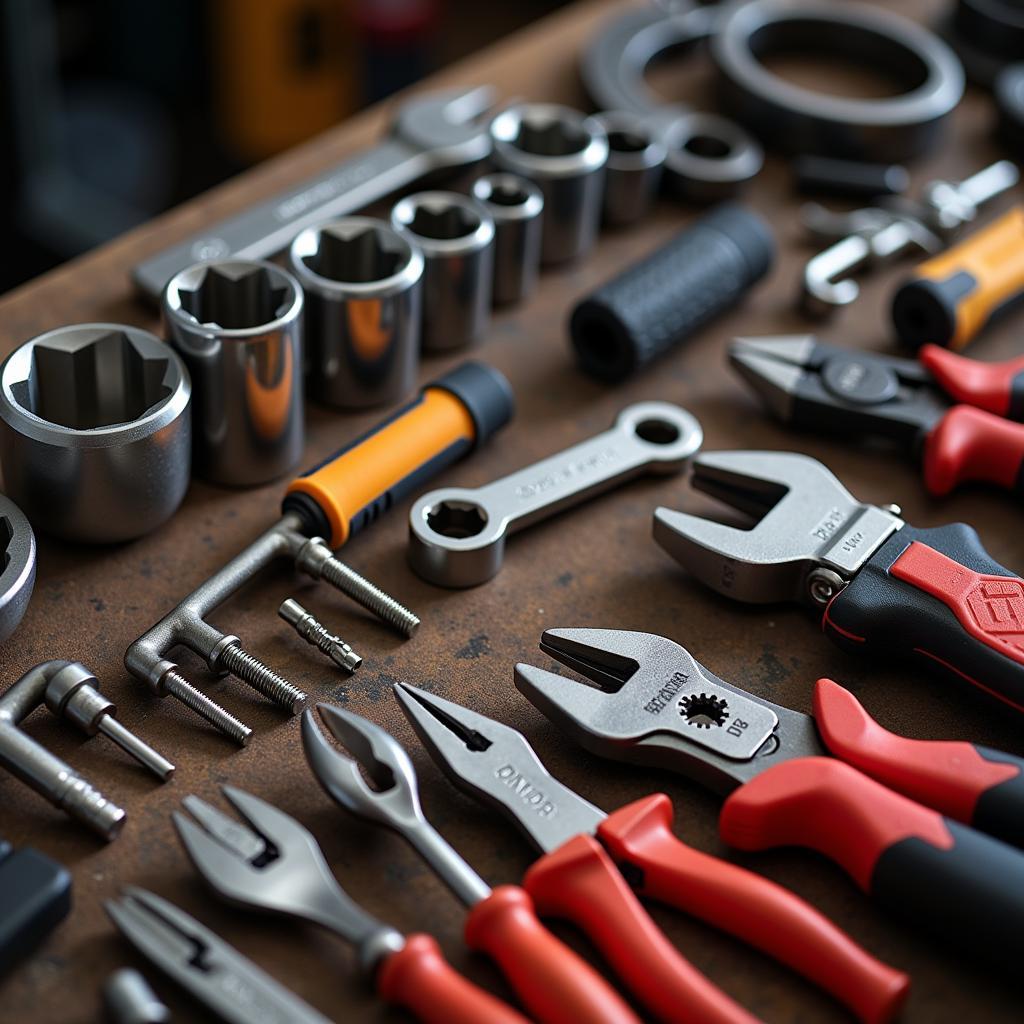Working on your own car can be empowering and save you money. But what tools do you need to get started? This guide will walk you through the essential tools for the home mechanic, from basic hand tools to more specialized diagnostic equipment, helping you decide what tools to buy to work on cars at home effectively.
Essential Hand Tools for the DIY Mechanic
Every home garage needs a core set of hand tools. These are your go-to tools for most basic car maintenance tasks. Think of them as the foundation of your at-home workshop. You’ll reach for these tools time and time again, so invest in quality to ensure they last.
- Wrench Set: A combination wrench set (with both open and closed ends) in both metric and SAE sizes is crucial. Wrenches are used for everything from tightening bolts to removing nuts.
- Socket Set: Similar to wrenches, socket sets offer more leverage and versatility. Look for a set with a variety of sizes and drive sizes (1/4″, 3/8″, and 1/2″).
- Screwdrivers: A set of Phillips and flathead screwdrivers in various sizes is essential. Consider investing in a set with interchangeable bits for greater flexibility.
- Pliers: Several types of pliers are useful, including slip-joint, needle-nose, and locking pliers. These are great for gripping, twisting, and cutting wires.
 Essential Hand Tools for Car Repair at Home
Essential Hand Tools for Car Repair at Home
Stepping Up Your Game: Diagnostic Tools
While hand tools are great for basic maintenance, diagnostic tools help you pinpoint problems when something goes wrong. These tools can range from simple code readers to more advanced scan tools. Choosing the right ones depends on your budget and technical skills. If you’re looking to improve your car diagnostic capabilities, check out our article on the best car diagnostic tool to buy.
- OBD-II Scanner: An OBD-II scanner is a must-have for any modern car. It reads diagnostic trouble codes (DTCs) from your car’s computer, giving you clues about what’s causing the issue.
- Multimeter: A multimeter measures voltage, current, and resistance, helping you diagnose electrical problems. It’s essential for testing batteries, circuits, and sensors.
- Test Light: A simple test light can quickly check for power or ground in a circuit. It’s a handy tool for troubleshooting electrical issues.
Specialized Tools for Specific Tasks
Beyond the basics, certain specialized tools can make specific car repairs much easier. These tools might not be needed for everyday maintenance but are invaluable for more involved projects. Do you need specialized tools to open a locked car door? Find out more in our guide on open car door tools.
- Jack and Jack Stands: Safety first! Never work under a car supported only by a jack. Jack stands provide a stable and secure platform for working underneath your vehicle.
- Torque Wrench: A torque wrench allows you to tighten bolts to a specific torque specification, which is crucial for certain engine and suspension components.
- Brake Bleeder Kit: Bleeding your brakes is an essential maintenance task, and a brake bleeder kit makes the process much easier and more efficient.
What about Snap-on tools?
Snap-on tools are known for their high quality and durability, but they come at a premium price. Are they worth the investment for the home mechanic? Find out more about them at our detailed snap on tools car guide.
Conclusion
Choosing the right tools to buy to work on cars at home depends on your skills, budget, and the types of repairs you plan to tackle. Starting with a core set of hand tools and gradually adding diagnostic and specialized tools as needed is a smart approach. With the right tools and a little know-how, you can save money and enjoy the satisfaction of working on your own vehicle.
FAQs
- What is the most important tool for a beginner mechanic? A good set of wrenches and sockets is essential for any beginner.
- Do I need a professional scan tool at home? A basic OBD-II scanner is sufficient for most home mechanics.
- How do I know which tools are right for me? Consider the types of repairs you plan to do and your budget.
- Where can I learn more about using car repair tools? There are numerous online resources and books available.
- Is it safe to work on my own car? Yes, as long as you follow safety precautions and use the proper tools.
- What should I do if I encounter a problem I can’t fix? Consult a professional mechanic.
- How do I maintain my car tools? Keep them clean, organized, and stored properly.
Common Scenarios and Questions
- Scenario: Check engine light comes on. Question: What tool do I need to diagnose the problem? Answer: An OBD-II scanner.
- Scenario: Need to change a flat tire. Question: What tools are required? Answer: Jack, lug wrench, and spare tire.
- Scenario: Want to check the battery voltage. Question: Which tool should I use? Answer: A multimeter.
Further Exploration
For more information on car repair tools and techniques, consider exploring these additional resources on DiagFixPro:
Need more assistance with your car diagnostic needs? Contact us via WhatsApp: +1(641)206-8880, Email: [email protected] or visit us at 910 Cedar Lane, Chicago, IL 60605, USA. Our customer support team is available 24/7 to help you.
